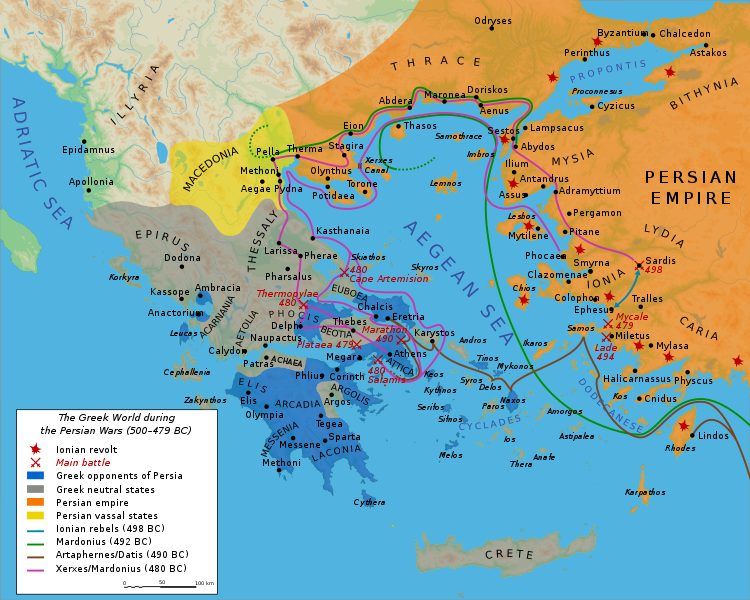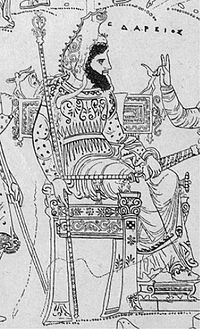| Belligerents | |
|---|---|
| Persian Empire | |
| Commanders and leaders | |
| Strength of the armies | |
9,000–10,000 Athenians,
1,000 Plataeans
|
25,000–300,000 infantry and 1,000 cavalry (modern estimates)
600 ships, 200,000–600,000 infantry, and 10,000 cavalry (various ancient accounts)
|
| Casualties and losses | |
192 Athenians,
|
6,400 dead
|

The involvement of Athens in the Ionian Revolt arose from a complex set of circumstances, beginning with the establishment of the Athenian Democracy in the late 6th century BC. In 510 BC, with the aid of Cleomenes I, King of Sparta (rule 520-489BC), the Athenian people had expelled Hippias, the tyrant ruler of Athens. With Hippias's father Peisistratus, the family had ruled for 36 out of the previous 50 years and fully intended to continue Hippias's rule. Hippias fled to Sardis to the court of the Persian satrap, Artaphernes and promised control of Athens to the Persians if they were to help restore him. In the meantime, Cleomenes helped install a pro-Spartan tyranny under Isagoras in Athens, in opposition to Cleisthenes, the leader of the traditionally powerful Alcmaeonidae family, who considered themselves the natural heirs to the rule of Athens. Cleisthenes, however, found himself being politically defeated by a coalition led by Isagoras and decided to change the rules of the game by appealing to the demos (the people), in effect making them a new faction in the political arena. This tactic succeeded, but the Spartan King, Cleomenes I, returned at the request of Isagoras and so the Cleisthenes, the Alcmaeonids and other prominent Athenian families were exiled from Athens. When Isagoras attempted to create a narrow oligarchic government, the Athenian people, in a spontaneous and unprecedented move, expelled Cleomenes and Isagoras. Cleisthenes was thus restored to Athens (507 BC), and at breakneck speed began to reform the state with the aim of securing his position. The result was not actually a democracy or a real civic state, but he enabled the development of a fully democratic government, which would emerge in the next generation as the demos realized its power.The new found freedom and self-governance of the Athenians meant that they were thereafter exceptionally hostile to the return of the tyranny of Hippias, or any form of outside subjugation; by Sparta, Persia or anyone else.
The Athenians and Eretrians sent a task force of 25 triremes to Asia Minor to aid the revolt. Whilst there, the Greek army surprised and outmaneuvered Artaphernes, marching to Sardis and burning the lower city. However, this was as much as the Greeks achieved, and they were then pursued back to the coast by Persian horsemen, losing many men in the process. Despite the fact that their actions were ultimately fruitless, the Eretrians and in particular the Athenians had earned Darius's lasting enmity, and he vowed to punish both cities. The Persian naval victory at the Battle of Lade (494 BC) all but ended the Ionian Revolt, and by 493 BC, the last hold-outs were vanquished by the Persian fleet. The revolt was used as an opportunity by Darius to extend the empire's border to the islands of the eastern Aegean and the Propontis, which had not been part of the Persian dominions before. The completion of the pacification of Ionia allowed the Persians to begin planning their next moves; to extinguish the threat to the empire from Greece, and to punish Athens and Eretria.

Cleomenes, unsurprisingly, was not pleased with the events, and marched on Athens with the Spartan army. Cleomenes's attempts to restore Isagoras to Athens ended in a debacle, but fearing the worst, the Athenians had by this point already sent an embassy to Artaphernes in Sardis, to request aid from the Persian Empire. Artaphernes requested that the Athenians give him an 'earth and water', a traditional token of submission, which the Athenian ambassadors acquiesced to. However, they were severely censured for this when they returned to Athens. At some point later Cleomenes instigated a plot to restore Hippias to the rule of Athens. This failed and Hippias again fled to Sardis and tried to persuade the Persians to subjugate Athens. The Athenians dispatched ambassadors to Artaphernes to dissuade him from taking action, but Artaphernes merely instructed the Athenians to take Hippias back as tyrant. Needless to say, the Athenians balked at this, and resolved instead to be openly at war with Persia. Having thus become the enemy of Persia, Athens was already in a position to support the Ionian cities when they began their revolt. The fact that the Ionian democracies were inspired by the example of Athens no doubt further persuaded the Athenians to support the Ionian Revolt; especially since the cities of Ionia were (supposedly) originally Athenian colonies.

In 492 BC, once the Ionian Revolt had finally been crushed, Darius dispatched an expedition to Greece under the command of his son-in-law, Mardonius. Mardonius re-conquered Thrace and compelled Alexander I of Macedon to make Macedon a client kingdom to Persia, before the wrecking of his fleet brought a premature end to the campaign. However in 490 BC, following up the successes of the previous campaign, Darius decided to send a maritime expedition led by Artaphernes, (son of the satrap to whom Hippias had fled) and Datis, a Median admiral. Mardonius had been injured in the prior campaign and had fallen out of favor. The expedition was intended to bring the Cyclades into the Persian empire, to punish Naxos (which had resisted a Persian assault in 499 BC) and then to head to Greece to force Eretria and Athens to submit to Darius or be destroyed. After island-hopping across the Aegean, including successfully attacking Naxos, the Persian task force arrived off Euboea in mid summer. The Persians then proceeded to besiege, capture and burn Eretria. They then headed south down the coast of Attica, en route to complete the final objective of the campaign—to punish Athens.

Now you are about to see the view that the generals wish to have, and see the heavily infanty of Athens against the supports of Persia Empire and the King of Athens, the fight will decide the future of Athens and her allies city-states of Greek, and the world will not be the same before!

Sem comentários:
Enviar um comentário